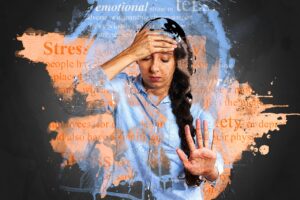
Stress
Many individuals want to know the symptoms of depression to recognize it in themselves or others.
Depression is a prevalent mental health condition that affects millions of people worldwide. While it may seem invisible to the naked eye, it leaves a profound impact on those who experience it and their loved ones. Recognizing the signs of depression is the first step toward getting the help and support needed to manage this challenging condition.
In this article, we will delve into the various signs of depression, shedding light on this often misunderstood mental health issue. By the end, you’ll have a better understanding of what depression looks like and why seeking help is crucial.
Persistent Sadness and Hopelessness:
One of the most common signs of depression is a persistent feeling of sadness or hopelessness that lasts for weeks or even months. This emotional weight can be overwhelming and may not necessarily be linked to a specific event or circumstance.
Loss of Interest in Pleasure:
People experiencing depression often lose interest in activities they once enjoyed. Hobbies, social outings, and even spending time with loved ones may feel like burdensome tasks rather than sources of joy.
Changes in Sleep Patterns:
Sleep disturbances are a hallmark of depression. This can manifest as either insomnia, where you struggle to fall or stay asleep, or as excessive sleeping, where you find it difficult to get out of bed in the morning.
Appetite and Weight Changes:
Depression can impact your appetite and lead to significant weight changes. Some individuals may eat excessively, seeking comfort in food, while others may have a reduced appetite and experience unintended weight loss.
Fatigue and Low Energy:
Feeling constantly drained, both mentally and physically, is another common sign of depression. Even simple tasks can become overwhelming and exhausting.
Difficulty Concentrating:
Depression can make it challenging to focus, make decisions, or remember things. This cognitive fog can hinder daily functioning and work or school performance.
Feelings of Worthlessness or Guilt:
Many individuals with depression experience feelings of worthlessness or excessive guilt, even when there is no apparent reason for these emotions.
Physical Symptoms:
Depression is not solely a mental health issue; it can manifest physically as well. Common physical symptoms include headaches, stomachaches, and muscle pain without any underlying medical cause.
Isolation and Social Withdrawal:
Depression often leads to social withdrawal, as individuals may feel disconnected from others or believe that they are a burden to friends and family.
Thoughts of Self-Harm or Suicide:
In severe cases, depression can lead to thoughts of self-harm or suicide. These thoughts should never be taken lightly and require immediate professional intervention.
Conclusion:
Recognizing the signs of depression is a crucial step toward managing this condition and seeking help. If you or someone you know is experiencing these symptoms, it’s important to reach out to a mental health professional or a trusted person in your life who can provide support. Depression is treatable, and with the right help, individuals can regain a sense of well-being and happiness in their lives. Remember, you are not alone in this journey towards better mental health.





